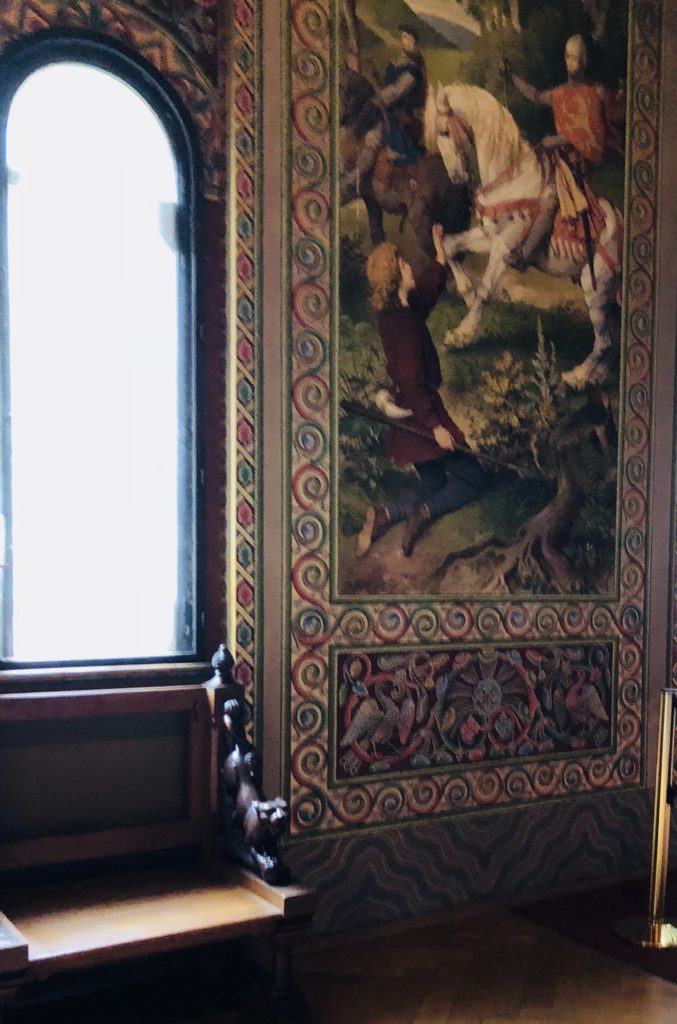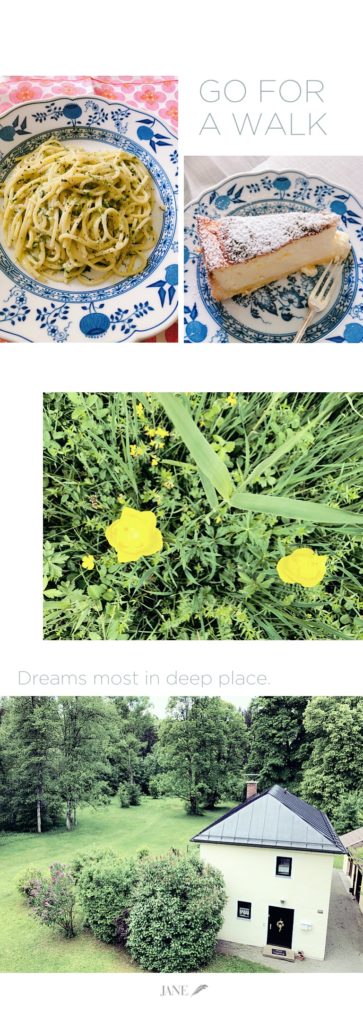I have heard about the fairytale castle, Neuschwanstein since a long time ago. It was a pleasure to visit there with my host brother, Carolus, who had probably been there a thousand times since his childhood. The vast forest guarded a group of bright red little houses at the foot of the hills. Cows and sheep wandered slowly on the Greenfield (“Spaziergang”) and the swans floated on the lake that mirrored the clouds and mountains. The blue Neuschwanstein and the yellow Hohenschwanstein decorated the mountains like two pearls. From a distance, I was amazed at the marvelous scenery. Even though it was rainy, Schloss Neuschwanstein jumping out of the green was still astonishingly magnificent and charming.



 Because Carolus was so familiar with everything here, we quickly “jumped” through the forest and stopped by the beautiful Schwannsee (Swan Lake). Dandelions and wildflowers accompanied our journey, and we could see Marienburg that bridged over the valley like a rainbow. I realized that the magnificence of the castles lied in its harmony with nature.
Because Carolus was so familiar with everything here, we quickly “jumped” through the forest and stopped by the beautiful Schwannsee (Swan Lake). Dandelions and wildflowers accompanied our journey, and we could see Marienburg that bridged over the valley like a rainbow. I realized that the magnificence of the castles lied in its harmony with nature.
During my visit inside the castle, I was most impressed by the marvelous frescos that featured Christian stories and Wagner’s operas like Lohengrin, Parsifal and Der Ring Des Nibelungen. After I came back, I watched the musical Ludwig II and got to know that he was the No.1 fan of Wagner at that time. He dreamt to become the Knight of the Swan after he had watched Lohengrin in his childhood, therefore, people nicknamed him the Swan King. The whole castle and the two lakes nearby, the Alpsee and Schwannsee, are his tribute to his idol Wagner and the dream of arts. A soulmate with Princess Sisi, he had a passionate yet melancholy character. He did not like socializing with fellow aristocrats or seizing wealth and power. Rather, he was so obsessed with the fantasies that his everyday behavior seemed almost crazy. The king’s fever for arts reflected on every aspect of his life, which almost predestined the tragic fall of his political career. Unfortunately, he was deprived of the political power at the age of 40, imprisoned and soon died mysteriously. His love for arts was a blessing for Wagner but a curse for himself.
In King Ludwig’s time, people accused him of squandering too much in the fairytale castles. Ironically, the tourism industry created by those castles are now one of the most important sources for the economy of Bavaria. Perhaps it is hard to say whether Neuschwanstein represents the extravagance of the royal family or the nobility of arts.


Carolus brought me to visit his family friends, a senior couple who lived near the castle. Outside the house, I noticed the beautiful fresco on the wall. The house looked like a startling Baroque arts museum inside. The candleholders and the furniture look like antiquities. Around the stairs hanged elegant oil paintings of the family members of three generations. From the host, I got to know that the house was already 140 years old. I was impressed by how well the old houses near the castle were preserved. In China, the community near a tourist attraction often has to be relocated, in order to serve the tourism industry. Nonetheless, in Germany, the will of the local residents was fully respected, and the history and culture could be inherited. I hope that my country learns from this in the future.
The kind hosts entertained me with a nice Bavarian cheesecake which is milkier and less sweet than American cheesecake. Their spaghetti with home-grown pesto is also amazing. The gentleman was very charming and knowledgeable. Surprisingly, he lived for one year in Beijing in his youth. It was interesting to see the cooking tools for steamed buns in their kitchen.

Through our trip, Carolus and I also talked about the politics in U.S and Germany. He said that the difference between the two countries’ systems is that in the U.S. everyone gets to be president. In contrast, the experience is required for important positions in Germany’s government. However, U.S. also has impeachment that can overthrow a president. In Germany, it is quite hard to overthrow a Chancellor. I was surprised to learn this. What did not surprise me was his and many Germans’ antipathy toward President Trump. He said that Trump was not “professional,” while Merkel and Macron were professional. He believed that Trump had the power to change a lot of things, but whether the changes would be positive remained unknown. I agreed with him mostly. For me, I wish the trade war between the U.S. and China would not aggravate and Trump would not be against the trend of globalization.
Nonetheless, we both thought that American people were quite friendly, open-minded and talkative. Although I was impressed by the diverse demographics in Germany, Carolus talked about his appreciation of the multi-cultural U.S. society. He also looked forward to visiting Los Angeles because it was a city of artistic creativity and full of opportunities.